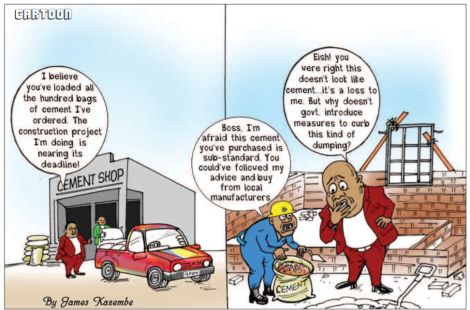
The Malawi Mining & Trade Review February 2019 edition is available for download.
The main stories included:
Foreign cement floods Malawi… Local producers bemoan “unfair competition”. 2,000 jobs might be at risk. According to The Daily Times,
About 2,000 workers in cement manufacturing companies risk losing their jobs as firms struggle to compete with cheap imports, an investigation by The Daily Times has revealed.
The investigations also revealed that management of the country’s three cement producers—Lafarge, Shayona and Cement Products—have on several occasions met officials in the ministries of Trade and Finance to consider invoking anti-dumping regulations, with no success.
Government responded (Ministry of Trade and Industry spokesperson, Mayeso Masokera:
Government, we have the mandate to balance the needs of both the producers and the consumers with regard to availability of this essential commodity as well as its price and the current cement importation does not amount to an influx.
We have had situations where cement prices rose to around MK12000 in 2017. Therefore, it is, essential that, cement availability and affordability is safeguarded for the healthy growth of the Malawi economy.
The Ministry is discussing with other Government agencies such as the Malawi Revenue Authority and the private sector stakeholder institutions so that issues of smuggling are addressed holistically. As a Ministry, we would like to appeal to the private sector to hold hands and collaborate with Government in order to root out this malpractice bedeviling our manufacturing sector
The Anti-Corruption Bureau (ACB) gets stakeholder input on corruption fight and ACB’s Director Reyneck Matemba said:
The extractive industry, including mining, is of interest to us as they have been a number of suspected cases of corrupt practices in the sector. You can see in this meeting we have representatives of the sector coming from as far as Mzimba.
Illegal gold mining resumes in hotspot areas. Chairperson for Nyasa Mining Cooperative (NMC) Percy Maleta offers one solution to give titles to the so-called illegal miners at the hotspots. He adds:
Creation of a formal market for the minerals is of utmost importance. For instance, we do not have a proper market for gold and other precious minerals in Malawi serve for few Chinese who normally smuggle the precious minerals. In the actual sense our country does not have any laid down procedures on how one can export gold. The government should create and establish market centres in all hotspot areas where gold and other precious minerals are produced.
Government backs bulk mineral sample exports…Companies not taking too much for lab testing. It’s good the government has spoken out to clarify misunderstandings around sampling as Globe Metals & Mining, Mkango Resources and Sovereign Metals all have sent samples for testing. I wrote about Malawi’s “stolen” minerals a few months ago.
Want to know more about drilling in the exploration stage of a mining project? Read Ignatius Kamwanje’s column for the month.
Sovereign Metals upbeat on Malingunde rutile prospects. According to Managin Director, Julian Stephens:
This discovery of large areas of high-grade rutile suggests the potential also for significant rutile deposits within Sovereign’s large grounding holding. Given the currently strong fundamentals of the titanium feedstock market, the Company intends to undertake further exploration and metallurgical studies to advance this potential rutile opportunity.
Grain Malunga shares Malawi Chamber of Mines and Energy report of member activities in 2018. In short, progress is made on exploration projects and the new Mines and Minerals Act is a welcome development. In his words,
Malawi continues to take advantage of the existence of renewable energy resources as projects with potential to bring about economic development. Rare earths, niobium and graphite have the highest potential to be developed. Malawi government needs to solve the energy crisis as a matter of urgency.
The Mines and Minerals Act 2018 will help bring stability and manage people expectation through community development agreements as a means of benefit sharing. Resource companies expect a stable fiscal regime to be able to meaningfully come up with a reasonable cash flow projection for their projects.
And at the Chamber’s Annual General Meeting, Kondwani Dombola, Acting Director of the Geological Survey Department, said studies unveil more mineral prospects in Malawi: Mchinji Dyke has potential for chromium, lead, zinc…Kayelekera uranium deposit bigger…Nchalo basin possible petroleum trap.
The Department of Mines has been conducing extensive consultations on draft safety regulations. While news came in this month that at miner was killed “by a big stone” at Jalawe coal mine in Rumphi and another man lost a finger at Fluoride Cement Company Limited Balaka in December last year.
In other news, Malawi has been graded as having made meaningful progress towards the Extractive Industries Transparency Initiative. More here.
And finally, it’s been 10 years since the Paladin subsidiaries and the Government of Malawi entered an agreement for Kayelekera uranium mine.
22 February 2007: On this day 12 years ago, Malawi signed an agreement with Paladin Energy (actually with two subsidiaries – one in Malawi and and notorious tax haven Netherlands) for Kayelekera uranium mine.
— Rachel Etter-Phoya (@MiningInMalawi) February 22, 2019
